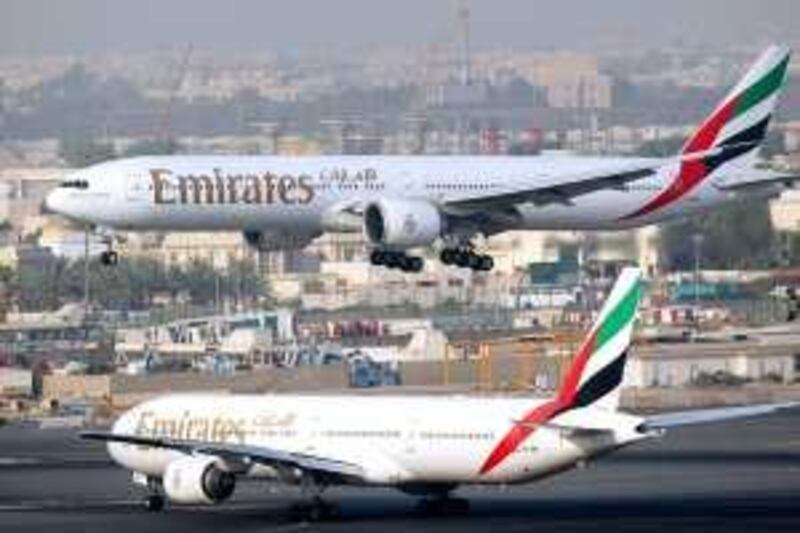Emirates Airline cemented its status as one of the most profitable carriers in the world with a strong recovery in net profit last year. Lower fuel prices, greater seat capacity and tight control over costs helped profits soar despite almost static revenue. "They have enjoyed massive expansion and to do that profitably is remarkable," said David Stewart, a principal analyst at Aerostrategy, a UK-based consultancy.
Profits more than quadrupled to US$964 million (Dh3.54 billion) in the year to March 31, contrasting with an estimated $9.4bn loss by airlines worldwide. "It has been an exceptional year of continued profitability against a backdrop of the worst global recession in generations," said Sheikh Ahmed bin Saeed Al Maktoum, the chairman and chief executive of Emirates. "We have no intentions of pulling back the reins of our expansion plans to suit the needs of our competition."
The sharp rise in profits was achieved even as the carrier's average ticket prices fell by 17 per cent, revenues were flat at $11.85bn and cargo volumes dropped by 8 per cent, according to its audited results. But Emirates, with almost 37,000 employees, making it one of the largest companies in Dubai, said it carried more passengers, helping to offset the fall in average ticket prices. Passenger traffic grew 21 per cent to 27.5 million passengers after it increased frequencies and routes with the arrival of 15 new wide-bodied jets, including four A380 superjumbos.
A campaign to reduce costs by 3 per cent, including offering voluntary unpaid leave for staff, also helped deliver the profits, the company said. In addition, declining energy prices gave the airline some respite following the dramatic rise in the price of oil in 2008. Last year the airline paid $3.24bn in jet fuel, an 18 per cent saving on its fuel bill in 2008. David Kaminski-Morrow, of the UK-based Air Transport Intelligence industry publication, said the results showed the benefits of basing an airline in the Middle East, where demand for air travel has proved the most resilient.
"It is another demonstration that, in the Middle East, it is easier to make a profit at the moment than in other parts of world," he said, noting that the region's geographical position between Asia, Africa and Europe, 24-hour airport operations and low-cost bases were also factors. This year, Emirates forecast double-digit growth, Sheikh Ahmed said, and was targeting another order for what is thought to be about 10 wide-bodied planes to be placed at the UK's Farnborough Air Show in July.
Emirates has made profits every year for the past 22 years. Unlike some regional carriers, Emirates publishes audited financial results to satisfy disclosure requirements from its bondholders. The airline's results also reflect its ownership of more than 25 associated companies in hospitality and retail, which contributed about 7 per cent of its profits last year. The airline and its sister company, the ticketing and ground-handling outfit DNATA, make up Emirates Group, with almost 50,000 employees. The group earnt $1.1bn in profits last year, helped by its DNATA arm contributing a record $167m. Officials said a dividend of more than $100m would be awarded to its shareholder, the Dubai Government.
With 146 planes still on order, Emirates will have to finance another $48bn worth of aircraft over the next decade. Its cash reserve stood at $3.4bn as of March, up from $2.4bn a year earlier. Debts and liabilities stood at $5.34bn, the airline said. Cargo volumes, which fell last year, were on the way back up and approaching 2008 levels, said Ram Menen, the divisional senior vice president of cargo at Emirates. The airline was focusing on growing economies such as India and would continue to "right-size" its business by adjusting capacity amid the recovery, he said.
igale@thenational.ae





